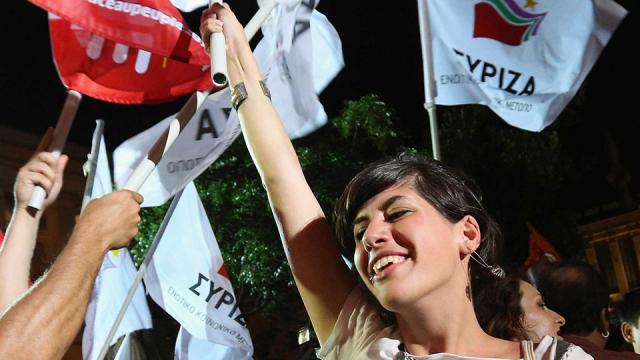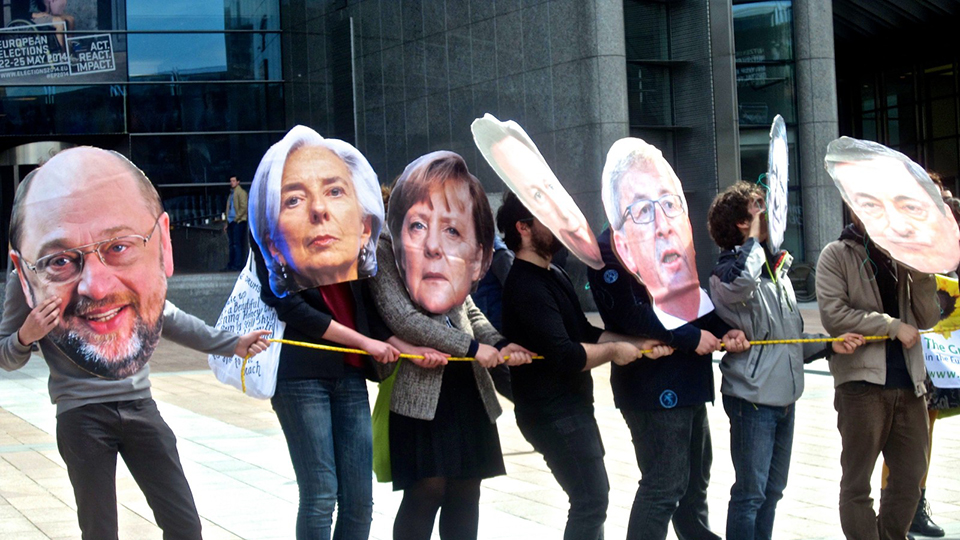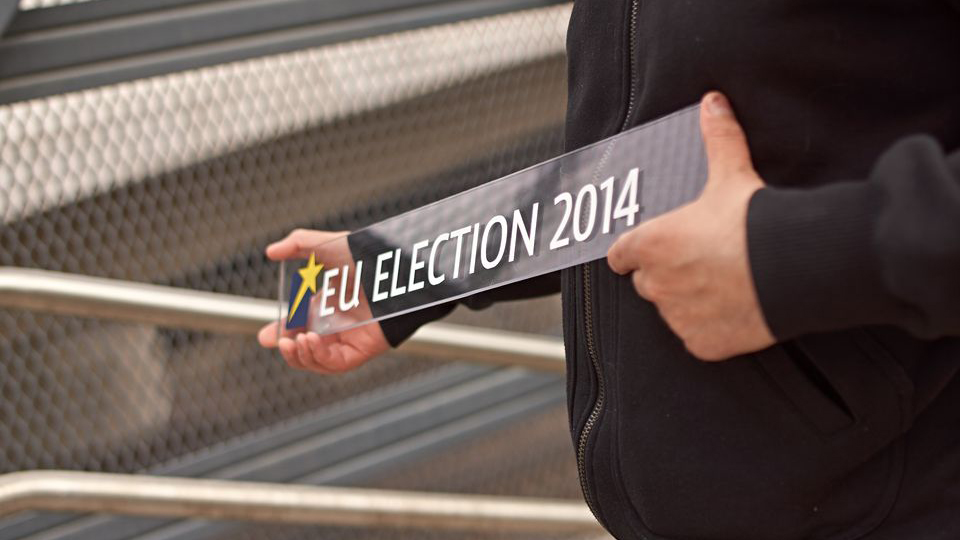
European politics were jolted as seldom before on Sunday when France's extreme nationalists triumphed in the European parliament elections, which across the continent returned an unprecedented number of MEPs hostile or skeptical about the European Union in a huge vote of no confidence in Europe's political elite.
France's Front National won the election there with a projected 25% of the vote, while the governing socialists of President François Hollande collapsed to 14%, according to exit polls.
In Britain the Nigel Farage-led insurrection against Westminster was also expected by all three main parties to deliver a victory for Ukip in the election, albeit with a lower lead than some opinion polls had been predicting in recent weeks. Turnout in Britain was 36%, higher than at the last European elections in 2009.
Four days of elections across 28 countries returned a record number of MEPs opposed to the E.U. project. Voters delivered a string of sensational outcomes, according to exit polls, with radical and nationalist anti-E.U. forces scoring major victories both on the far right and the hard left.
In Greece, Alexis Tsipras led the Syriza movement to a watershed victory for the left over the country's two traditional ruling parties – currently governing in coalition – the New Democracy conservatives and the Pasok social democrats. The neo-fascists of Golden Dawn took about 10%.
Exit polls suggest the nationalist anti-immigrant Danish People's party won by a similar margin in Denmark.
In Austria the far-right Freedom party was projected to take a fifth of the vote. In Hungary, the neo-fascist Jobbik movement took around 15%.
On the hard left, Sinn Féin did well in Ireland, and Die Linke took about 8% in Germany. In Germany, Chancellor Angela Merkel's Christian Democrats (CDU) scored an expected easy victory, but the E.U.'s most powerful state, also returned its first Euroskeptics in the form of the Alternative for Germany as well as its first neo-Nazi MEP from the Hitler apologists of the National Democratic party of Germany, according to German TV projections.
Merkel's party dropped several points while the Social Democrats (SPD) made significant gains, narrowing the gap between the two big parties to about eight percentage points.
The election mattered more than ever because the Strasbourg-based parliament has gained greater powers, meaning it will have a strong say in most E.U. legislation over the next five years and will also shape the outcome of the battle for the most powerful post in Brussels, the new head of the E.U. executive, the European Commission.
But its mandate to exercise those powers was dented by the low turnout of roughly 43%, raising renewed questions about the parliament's legitimacy.
Europe's Christian Democrat bloc, led by Merkel's CDU, were expected to emerge as the biggest grouping of MEPs, albeit forfeiting some 50 seats, with the Social Democrats improving their performance to come second.
The two big pro-E.U. blocs can easily muster a majority between them in the 751-seat chamber and may club together in the form of a Berlin-style grand coalition to prevent legislative gridlock.
But after five years of currency and debt crisis, recession, and savage austerity, the results exposed a Europe of division: extremely volatile, fragmented, with voters disenchanted and those choosing to vote cutting their support for the mainstream in favor of fringe parties.
Average turnout across the E.U. was put at just over 43%, the same as the last election in 2009 which was the lowest ever for a parliament that has steadily accrued greater powers.
For Europe's political class, the result in France was the most shocking. Le Pen promptly described the vote as support for "France for the French," called on the government to resign and for Hollande to dissolve the French parliament.
Whether voters opted for the far right, hard left, or opposition, the anti-incumbent backlash was felt in most parts of Europe and is likely to have a profound impact on national politics everywhere as well as on the conduct of policy-making at the E.U. level.
Despite the low turnout, a spokesman for the European parliament described the voter participation as "historic," arguing that the trend towards lower turnout since the first direct elections in 1979 had been reversed.
The immediate impact of the election will vary. The performance of Le Pen will have unknown consequences for French politics while in Italy the expected victory of the new prime minister, Matteo Renzi, will be seen as a mandate for his proposed reforms despite the fact that his administration is unelected.
The results will bring pressure for early national elections in Greece and Bulgaria while a sweeping victory of social democrats and Greens in Sweden signals a thorough defeat for the governing conservatives in September.
As the political elite licks its wounds and considers it options, attention will promptly shift to the formation of coalitions of voting blocs in the parliament and infighting over how the top jobs in Brussels are to be distributed over the coming months.
Leading Christian Democrats predicted they would be the biggest bloc by a margin of around 20 seats and laid claim to the post of the new head of the European commission being filled by Jean-Claude Juncker, the former prime minister of Luxembourg.
However, his rival, Martin Schulz, a German Social Democrat, was feted last night in Berlin as the moral victor of the election. Both camps will now seek to lure smaller parties and independent MEPs to their side to try to muster an absolute parliamentary majority needed to endorse a new commission chief.
National government leaders are to gather in Brussels on Tuesday evening to plot their next moves. Hollande will be the weakest figure at the summit, while David Cameron will seek to exploit the impact of the electoral earthquake to bolster his case for deep seated reform of the E.U.
Despite the National Front triumph, it remains to be seen whether Le Pen will be able to cobble together enough parties from enough countries to form a voting bloc in the new parliament. That requires a minimum of 25 MEPs from at least seven countries.
While she will easily muster the MEP numbers, potential allies in Belgium and Slovakia may not get into the parliament, making it more difficult to get seven countries. Le Pen's biggest ally, Geert Wilders and his Freedom Party in The Netherlands, did less well than expected.
It also remained to be seen whether Cameron would be able to maintain his breakaway faction of European Conservatives and Reformists. His Polish allies were projected to take 19 seats, suggesting they would supplant the Tories as the biggest national contingent in the bloc.
In Greece victory for Syriza would appear to reflect popular frustration with the harsh spending cuts the government has adopted in recent years to meet the terms of its economic rescue program.
The surge in support for the far left raises doubts about how much longer the centre-right government can last with a parliamentary majority of just two seats, although government spokesman Simos Kedikoglou said there was no question that the government would not finish its four-year term.
"It's easy for people to cast a protest vote in European elections," he told Greek television. "The political scenario of a government collapse, which Syriza was trying to paint, has not been borne out by the facts."
In a first for Greece, neo-Nazi party Golden Dawn looks set to elect at least two out of Greece's 21 MEPs.
The party ranks third with up to 10% of the vote, despite an ongoing criminal investigation and the fact that several of its leading members are in pre-trial detention.
3 WAYS TO SHOW YOUR SUPPORT
- Log in to post comments
















